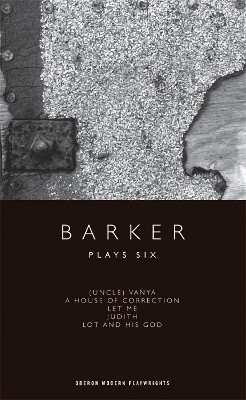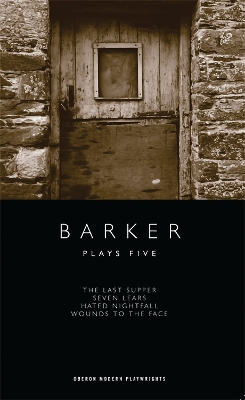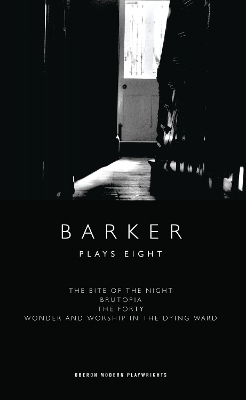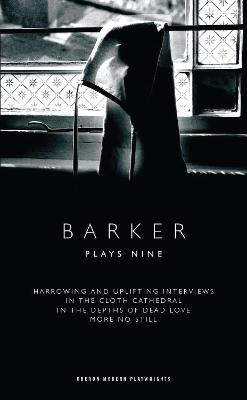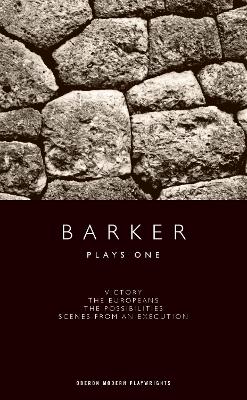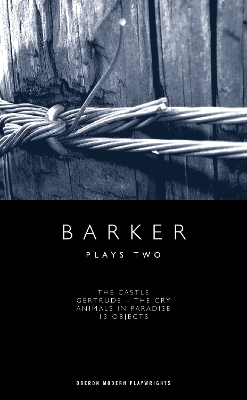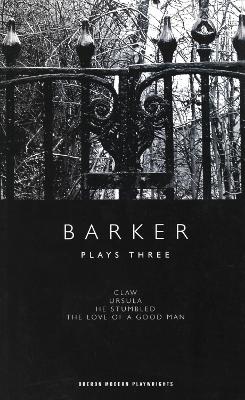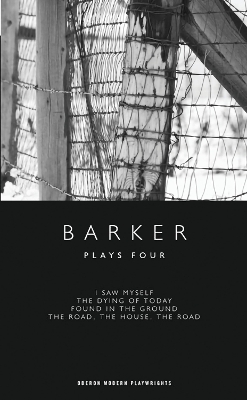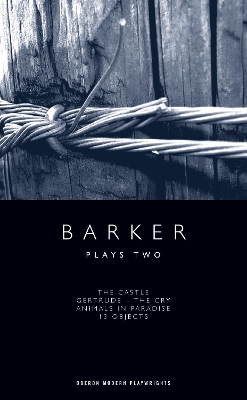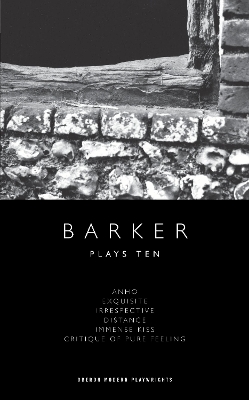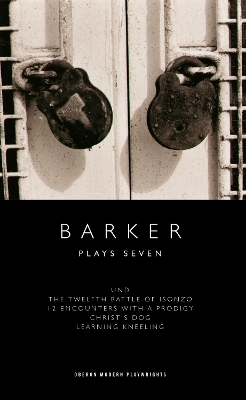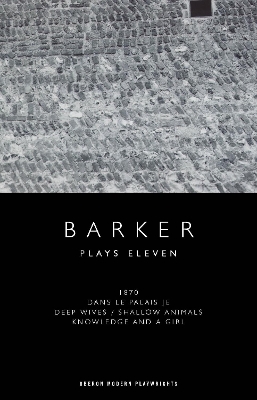Oberon Modern Playwrights
12 total works
Barker's radical rewriting of Chekhov's classic Uncle Vanya brought him more controversy than most of his other works put together. Interrogating not so much Chekhov's text as the use to which society has put it, Barker turns Vanya's defeat into victory and converts a play of sadness into a tragedy of desire. A House of Correction is a meditation on cause and effect. Set on the eve of a war which may destroy a society, the seemingly arbitrary arrival of a messenger with a vital communication sets off an agonizing train of events in the lives of three desperate women.
Few works of drama can have plumbed the depths of solitude and rage that characterize Let Me, a nightmare set on the frontiers of the Roman Empire during the barbarian invasions. Biblical narratives serve as the origin of two shorter works, of which Judith is a contemporary classic of cultural conflict, a reinterpretation of the status of the heroine in Israel's war of survival against the Assyrians. In Lot and His God, the imminent destruction of Sodom simultaneously licenses the moral decay of an angel and the erotic epiphany of an adored wife.
Howard Barker is one of the most significant and controversial dramatists of his time. His plays challenge, unsettle and expose.
Both The Last Supper and Seven Lears exemplify Barker's way with great religious and literary stories, the first placing the willful suicide of a Christ-like prophet, Lvov, in the context of modern chaos, illuminating his moral ambiguities with comic or painful parables, the second taking its inspiration from the significant absence in Shakespeare's play, that of Lear's wife, the queen whose murder is here discerned as the origin as the great family tragedy.
The execution of the Russian royal family remains shrouded in mystery - not least that of the identity of two bodies discovered in the mass grave years after the event. In Hated Nightfall Barker's speculative imagination leads him to identify these as the children's tutor, Dancer, and a recalcitrant servant, Jane. Dancer is perhaps Barker's archetypal hero, febrile, iconoclastic, yet in search of a self-sacrifice nothing appears to justify. In Wounds to the Face, our complex and sometimes violent relations with our own physiognomy form the psychological link between related scenes of wounding, notoriety, shame and vanity in a play of kaleidoscopic energy and imagery.
In Brutopia Barker’s controversial portrait of the humanist Thomas More is shaped around his strained relationship with his daughter Cecilia, here discovered to be the author of a counter-text to her parent’s infamous Utopia. Cecilia’s wit and cruelty mark her out as one of Barker’s least compromising and heroic young women.
The Forty is a significant departure from Barker’s dramatic practice, his investment in language reduced to a few phrases which punctuate detailed scenes of conflict and solitude. Physical movement, and intense concentration on gesture show the author’s flair for visuality in a new and surprising way.
The theme of sacrifice features increasingly in Barker’s theatre, and in Wonder and Worship in the Dying Ward it is a mother’s refusal to apologize for an act of passion – notwithstanding the dire consequence for her own child – that is at the heart of the argument. Set in a home for terminally-ill patients, many of whom create a hilarious chorus around the protagonists, Wonder and Worship in the Dying Ward shows Barker’s imagination in its most startling form.
The latest volume in Oberon's Howard Barker series comprises the plays Harrowing and Uplifting Interviews, In the Cloth Cathedral, In the Depths of Dead Love and More No Still.
Howard Barker is one of the most significant and controversial dramatists of his time. His plays challenge, unsettle and expose. These plays are among his best-known works, and their energy, poetic language and imagination have fixed them firmly in the international repertoire.
Exploring the tragic form defined by Barker as Theatre of Catastrophe, three of the plays speculate on human behaviour in moments of historical crisis. Victory is set in the English Civil War and follows the ethical voyage of a widow towards personal reconstruction. The Europeans takes one of the great eruptions of Islamic imperialism asthe background for a young woman's insistence on her right to her own identity. Scenes from an Execution shows the struggle of an independently-minded artist against the power of the Venetian state.
The Possibilities, a disturbing series of short plays set in various times and cultures, reveals Barker's unconventional way with moral dilemmas.
Howard Barker is one of the most significant and controversial dramatists of his time. His plays challenge, unsettle and expose. The plays in this volume examine collisions of culture, gender and creed at moments of turmoil, developing the tragic form Barker defines as Theatre of Catastrophe.
The Castle is set at the end of Crusades and describes the clashes that occur when returning soldiers bring an Arab architect home with them as a prisoner.
Barker's abiding interest in interrogating the great classics for their 'silences' is shown in Gertrude - The Cry, his re-writing of the Hamlet story. Scarcely examined in Shakespeare, the passion of Gertrude for Claudius is made the centre of this harrowing tragedy, casting new light on the personality of Hamlet himself.
Animals in Paradise was commissioned by the Swedish and Danish governments to celebrate their connection by bridge, a symbolic finish to centuries of antagonism. Barker's unexpected treatment of the theme provoked unrest on its first showing.
13 Objects movingly reveals the investment we make in inanimate things, their power to unsettle us, and how their talismanic qualities license new ways of seeing the world.
The plays in this volume range over twenty years, beginning with Barker's first major work for the stage, Claw, a study of urban discontent and political impotence, developed over three stylistically contrasting acts. Its terrible conclusion marked the debut of a vivid dramatic imagination.
In Ursula Barker's engagement with the pains of the past, and his way of reinvigorating ancient arguments reaches a high point in his treatment of the legend of St Ursula and the martyrdom of 11,000 virgins, where the virtues of celibacy and marriage are set against the catastrophic passion of a woman described as a 'perfect liar'.
Barker's scrutiny of the body and its complex meanings is never more intense than in He Stumbled, the tragedy of a celebrated anatomist whose last dissection becomes his own.
The body as a site of political and personal investment is also at the heart of The Love of a Good Man, an early work set on the empty battlefields of the Great War, where the burial of the dead becomes a pretext for private ambition as well as national grief.
Howard Barker is one of the most significant and controversial dramatists of his time. His plays challenge, unsettle and expose.
In I Saw Myself a woman's longing to understand her compulsion to transgress the laws of her society comes into collision with the conventions of an art form. In the weaving of a tapestry Barker's13th century heroine privileges private life over public responsibility. If she is cruelly punished she is also granted self-awareness.
A critical moment in social decay is also at the centre of The Dying of Today, in which a stranger who luxuriates in the telling of bad news observes the effects of his devastating narrative on a humble barber. The barber's recovery from pain, and the beauty of his sensibility, bring the two strangers into an emotional proximity.
Barker's most experimental work in form and content is probably Found in the Ground, a mobile, musical work set during the last days of an aged Nuremberg judge whose baying hounds and burning library form an uncanny background to his wayward daughter's struggle to make meaning from the atrocities of the 20th century.
The contradictions of the humanist personality are explored in The Road, the House, the Road. Erasmus' obscure colleague Aventinus was found dead on a wintry road. How he arrived at his solitary death forms the subject of this speculation on scholarship, mischief and the murderer's vocation.
Includes the plays The Castle, Gertrude - The Cry, Animals in Paradise and 13 Objects.
Howard Barker is one of the most significant and controversial dramatists of his time. His plays challenge, unsettle and expose. The plays in this volume examine collisions of culture, gender and creed at moments of turmoil, developing the tragic form Barker defines as Theatre of Catastrophe.
The Castle is set at the end of Crusades and describes the clashes that occur when returning soldiers bring an Arab architect home with them as a prisoner.
Barker's abiding interest in interrogating the great classics for their 'silences' is shown in Gertrude - The Cry, his re-writing of the Hamlet story. Scarcely examined in Shakespeare, the passion of Gertrude for Claudius is made the centre of this harrowing tragedy, casting new light on the personality of Hamlet himself.
Animals in Paradise was commissioned by the Swedish and Danish governments to celebrate their connection by bridge, a symbolic finish to centuries of antagonism. Barker's unexpected treatment of the theme provoked unrest on its first showing.
13 Objects movingly reveals the investment we make in inanimate things, their power to unsettle us, and how their talismanic qualities license new ways of seeing the world.
The tenth collection of plays by Howard Barker, one of the most significant and controversial dramatists of our time. His plays challenge, unsettle and expose. Plays Ten comprises the plays Ahno, Distance, Critique of Pure Feeling, Irrespective, Immense Kiss, Exquisite.
_x000D_
In Ahno, A Prince of Now, a youthful dictator is revealed as simultaneously revolutionary and reactionary, in politics and in love. His shocking efforts to create a new social order are mirrored in his unconventional passion for a seventy-five year old woman, who along with his devoted commissar, a group of fanatical priests, and a disturbingly perceptive Dalmatian, make up a menacing court of activists.
_x000D_
In Exquisite, Barker’s theme is the ethical ambiguity of slavery. In a dimly feudal setting, but constantly referring to our time, unsolved murders decimate a stable community. The protagonist, a loyal and uncritical serf, declines to speculate on the cause, whilst at the same time possessing the power to put an end to it. His ambiguous relationship with authority, and his refusal to quarrel with his own status, reveals Barker’s heretical manner with moral platitudes.
_x000D_
Alongside full-scale and even epic dramas, Barker has always written short works for small casts. In Distance he views the horrors of The Great War from an unusual perspective, that of the mother of a killed son, who arrives at her own philosophy of mourning. In Irrespective, a reclusive intellectual – in his final years – finds himself pestered for moral teaching by a wretched populace which has hitherto ignored him. In Critique of Pure Feeling, an old woman, sceptical of love but not of property, finds herself recklessly participating in an erotic duel. Immense Kiss, one of Barker’s most terrible visions, takes place as an army enters a besieged city, where a young conscript, discovering a woman abandoned in a room, finds himself stretched between longing and civility.
Howard Barker is Barker is an internationally renowned dramatist. There has been a recent resurgence of presentations of his plays in Britain, with particularly acclaimed productions at the Arcola theatre and the Hackney Empire in recent years. He has a sizable following on the European mainland.
Barker’s theatre has never sought to reproduce the real world on stage, but 1870 is the first of his plays to be set in Hell. An executed traitor, whose passion for betrayal is akin to a faith, meets other victims of that terrible year in a sordid room. Inevitably they are inspected by God, but in a shape none could have predicted and only he can delight in.
In Dans Le Palais Je, Barker’s nihilistic landowner at once establishes a different tone as she survives waves of social unrest and outbids the cruel with her own cruelty. In this chaos, she relies on the delivery of obscure but meaningful words which arrive in sealed envelopes to prepare her for a succession of ordeals.
Deep Wives and Knowledge and a Girl are short pieces, firmly established in the European theatre repertoire. In the first, a revolutionary movement called the Alterations puts a rich woman in the hands of her servants. The body, and its political meanings, is at the heart of this uncanny work, written for two actresses and a mechanical dog. In Knowledge and a Girl, Barker reinterprets the Snow White fable from the perspective of the Stepmother.
